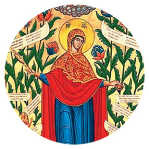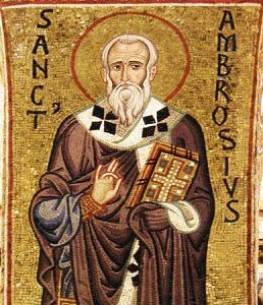“The Nativity of Christ. — He has come upon earth, He Who in the beginning created us from earth and breathed His Divine breath into us; He has come Who “giveth to all life, and breath, and all things” (Acts xvii. 25.); He has come, He Who by a single word called all things visible and invisible from non-existence into existence, Who by a word called into being birds, fishes, quadrupeds, insects, and all creatures, existing under His almighty providence and care; He has come, He Whom the innumerable hosts of Angels continually and joy. And in what humility has He come! He is born of a poor Virgin, in a cave, wrapped in poor swaddling clothes, and laid in a manger. Riches, honors, glory of this world! fall down, fall down in humility, tearful devotion, and deep gratitude before the Savior of men, and share your riches with the poor and needy. Do not pride yourselves on your visionary, fleeting distinctions, for true distinction can only be found in virtue. Glory of this world! learn here, before the manger, your vanity. Thus, let us all humble ourselves; let us all fall down in the dust before the boundless humility and exhaustion of the Sovereign of all, of God, Who has come to heal our infirmities, to save us from pride, vanity, corruption, and every sinful impurity.” + St. John of Kronstadt, My Life in Christ
“When God became known to us in the flesh, He neither received the passions of human nature, nor did the Virgin Mary suffer pain, nor was the Holy Spirit diminished in any way, nor was the power of the Most High set aside in any manner, and all this was because all was accomplished by the Holy Spirit. thus the power of the Most High was not abased, and the child was born with no damage whatsoever to the mother’s virginity.” + St. Gregory of Nyssa, Against Eunomius, Hom. II, PG 45, 492
“Why is it hard to believe that Mary gave birth in a way contrary to the law of natural birth and remained a virgin, when contrary to the law of nature the sea looked at Him and fled, and the waters of the Jordan returned to their source (Ps. 113:3). Is it past belief that a virgin gave birth when we read that a rock issued water (Ex. 17:6), and the waves of the sea were made solid as a wall (Ex. 14:22)? Is it past belief that a Man came from a virgin when a rock bubbled forth a flowing stream (Ex. 20:11), iron floated on water (4 Kings 6:6), a Man walked upon the waters (Mt. 14:26)? If the waters bore a Man, could not a virgin give birth to a man? What Man? Him of Whom we read: ‘…the Lord shall be known to the Egyptians, and the Egyptians shall know the Lord in that day; and they shall offer sacrifices, and shall vow vows to the Lord, and pay them’ (Is. 19:20).
In the Old Testament a Hebrew virgin (Miriam) led an army through the sea (Ex. 15:21); in the New testament a king’s daughter (the Virgin Mary) was chosen to be the heavenly entrance to salvation.” + St. Ambrose, Synodal Letter 44
“After the normal nine-month gestational period, Christ was born at the beginning of the tenth, in accordance with the law of gestation. It was the birth that surpassed the established order of birthgiving, as it was without pain; for, where pleasure had not preceded, pain did not follow. And just as at His conception He had kept her who conceived Him virgin, so also at His birth did He maintain her virginity intact, because He alone passed through her and kept her shut [Ezekiel 44:1-3].
While the conception was by ‘hearing’, the birth was by the usual orifice through which children are born, even though there are some who concoct an idle tale of His being born from the side of the Mother of God. For it was not impossible for Him to pass through the gate without breaking its seals. Hence, the Ever-Virgin remained virgin even after giving birth and never had converse with a husband as long as she lived.” + St. John of Damascus, Exposition of the Orthodox Faith, Bk. 4, Ch. 14
“Come, let us wonder at the virgin most pure, wondrous in herself, unique in creation, she gave birth, yet knew no man; her pure soul with wonder was filled, daily her mind gave praise in joy at the twofold wonder: her virginity preserved, her child most dear. Blessed is He who shone forth from her!”
— St. Ephraim the Syrian, Songs of Praise
This Nativity night bestowed peace on the whole world;
So let no one threaten;
This is the night of the Most Gentle One – Let no one be cruel;
This is the night of the Humble One – Let no one be proud.
Now is the day of joy – Let us not revenge;
Now is the day of Good Will – Let us not be mean.
In this Day of Peace – Let us not be conquered by anger.
Today the Bountiful impoverished Himself for our sake;
So, rich one, invite the poor to your table.
Today we receive a Gift for which we did not ask;
So let us give alms to those who implore and beg us.
This present Day cast open the heavenly doors to our prayers;
Let us open our door to those who ask our forgiveness.
Today the DIVINE BEING took upon Himself the seal of our humanity,
In order for humanity to be decorated by the Seal of DIVINITY.
— St. Isaac Syrian, Nativity Sermon
Source: Nativity of Jesus | Orthodox Church Quotes (wordpress.com)
Comments, suggestions, and submissions can be sent to annetteglass03@gmail.com







